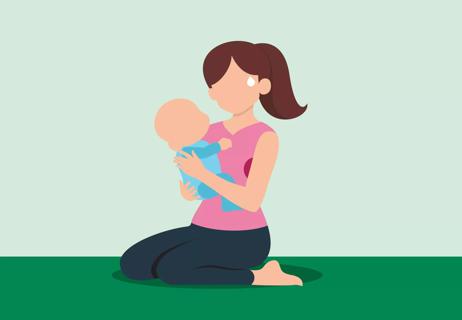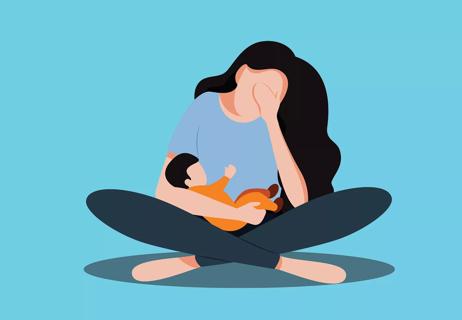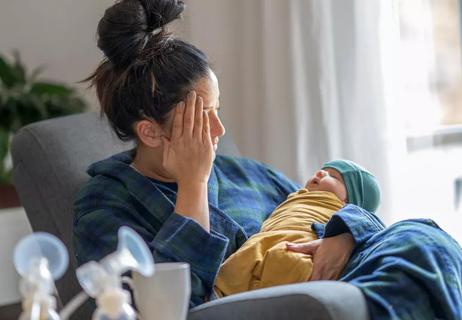Having sex after giving birth isn’t only about being medically ready

When a newborn enters your life, your bedroom thoughts are certainly not what they used to be. The bedroom was likely your place of quiet rest, peace and often, where you might have expressed your sexuality. With a newborn, though, many of these things may seem far, far away.
Advertisement
Cleveland Clinic is a non-profit academic medical center. Advertising on our site helps support our mission. We do not endorse non-Cleveland Clinic products or services. Policy
That will change with time. Your body will heal. You’ll become more comfortable with your new role as a parent. Eventually, your thoughts will probably be less, “Let’s get some sleep” and more, “Let’s get physical.”
“Postpartum sex is one of those things people don’t tend to talk about a lot, but we should,” says Ob/Gyn Jacqueline Zuponcic, DO. “There’s a lot happening physically and mentally after having a baby that will affect your sex life.”
We talked with Dr. Zuponcic about what you can expect for your sex life after giving birth.
For starters, all births are different. All postpartum experiences are different. And all sexual desires — say it with me — are different.
Dr. Zuponcic explains that when your healthcare provider clears you to engage in sex physically, that doesn’t mean you’re necessarily going to be ready-ready for sex.
“Sexual desire in women is determined by what we call bio-psycho-social triggers,” Dr. Zuponcic says. “For many women, sexual desire is like an unconscious checklist in their heads.”
There are biological things, like our hormones, our physical recovery, our breast tenderness and our fatigue.
There are psychological things, like postpartum depression and baby blues. Not everyone feels their best when they haven’t had time to brush their teeth and have a shower.
Advertisement
There are social things, like what it means for us to be a parent and how we interact with our partners in this new role.
Then, there’s just all the other stuff. Are the socks off the floor? Are the dishes put away? How does one baby generate so much laundry?
In other words, no matter when your provider says you’re physically ready to engage in sex, you may not feel prepared or interested quite yet. That’s natural and should be respected. Listen to your body.
Recommendations regarding when it’s safe to engage in sexual intercourse after giving birth will mostly depend on the circumstances of your delivery. Generally, your provider will likely recommend waiting two to six weeks after your baby is born before getting all hot and heavy.
There are a few reasons to wait.
Your pelvic floor (the muscles that line your vagina and support your bladder) will need some time to rest and recover. Also, following delivery, your cervix takes some time to return to its pre-pregnancy state. Infection can make its way in more easily during this time, too.
“It’s best to keep things out of the vagina for a few weeks. That includes tampons, saliva, penises, fingers and toys,” Dr. Zuponcic says. “Your cervix hasn’t yet shrunk back down. After having a baby, it’s easier for bacteria to get into the uterus and make you very sick.”
For those who experienced tearing or heavy bruising over their vulva (the outside of your vagina), your provider will likely recommend abstaining from sex for six weeks.
“If you had stitches following your delivery, those sutures need time to dissolve, and the tissue needs time to heal so that it’s strong enough to withstand sexual intercourse,” Dr. Zuponcic explains. “You want to wait for those sutures to be fully dissolved before engaging in any sexual activities, including intercourse and receiving oral sex.”
If you had a tear-free vaginal delivery and no other complications, your provider may say you can resume sexual activity as soon as two weeks after giving birth, if you so choose.
If you had a Cesarean section (C-section) delivery, your doctor will likely suggest you abstain from sex for at least six weeks. That’s because your incision needs time to heal to avoid complications. Often, too, people who delivered babies via C-section were dilated prior to giving birth. That means your uterus may still be more prone to infection if your cervix (the opening to your uterus) is still open.
Your sexual desires and experiences may be different from what you remember for a little while. That’s very normal, too. Dr. Zuponcic recommends taking it slow and practicing open communication with your partner.
Advertisement
“There are things that are going to work and there are things that may not work,” she says. “Careful, thoughtful intercourse and good communication between you and your partner about what’s working and what’s not, especially the first few times you try, is important to your experience, and probably theirs, too.”
Pain during sex isn’t OK, but some discomfort during those first few postpartum attempts can be expected. Scar tissue from tears is often less stretchy than the surrounding vaginal tissue. As the scar heals over time, it often organizes and softens. Serial attempts at sex with your partner may help stretch and soften that scar tissue as well. Just remember to communicate with one another through these times.
If you’re breastfeeding, you may leak milk. Consider wearing a bra while having sex. You also may be more prone to vaginal dryness.
“When you’re breastfeeding, your circulating estrogen levels drop, which can make your vaginal tissue very thin, as opposed to that stretchy, lubricated tissue you’re used to,” Dr. Zuponcic explains.
Once you’ve stopped breastfeeding, or after your periods have resumed, that thin dry vaginal tissue tends to improve in the weeks that follow. Many people have tenderness over their vaginal scars that doesn’t go away until this time as well.
Advertisement
If sex is painful or remains uncomfortable after a few tries, talk to your healthcare provider. They should be able to discuss medications and lubrication options that may help. Dr. Zuponcic says some people also benefit from a form of physical therapy that works to strengthen the pelvic floor.
You’ve been through a lot. You grew a little person and delivered them into the world. And now, you have a newborn who depends on you night and day. It can be exhausting. Sex just may not be on top of your list of things to do right now.
“You have a lot going on caring for a new life,” Dr. Zuponcic says. “You have this new human in your home. You have to navigate a whole new routine. Sex being at the bottom of the list is not unusual. Your desire generally does increase again after some time.”
Further contributing to a lower libido than your pre-pregnancy days could be postpartum blues, also known as “baby blues.” Dr. Zuponcic says 85% of women experience postpartum blues following the birth of a baby. If you have postpartum blues, you may be prone to crying, anxiety and sadness for no apparent reason for a week or two after delivery. Postpartum blues are also likely to lower your sex drive.
Advertisement
Postpartum blues symptoms shouldn’t last long and are relatively mild. More severe and longer-lasting feelings of anxiety and sadness could be postpartum depression, a serious condition. Talk to your provider if you’re experiencing the following symptoms:
The national Office on Women’s Health recommends spacing out pregnancies by at least 12 months. Some doctors recommend closer to 18 months. Dr. Zuponcic says this means waiting at least a year between having one baby and conceiving the next. That’s because your risk of pregnancy complications, including premature birth and postpartum depression, is higher if your pregnancies are closer together than that.
Dr. Zuponcic says women who aren’t breastfeeding will likely ovulate for their first time around 39 days postpartum. You will ovulate before you get your period. So, you can become pregnant after giving birth even if you haven’t had a period yet.
“If you don’t plan on becoming pregnant, having a birth control plan in place from the time you leave the hospital is your best bet,” Dr. Zuponcic says. “If you wait to start contraception until after you begin menstruating again, it may be too late to avoid an unplanned pregnancy.”
If you don’t intend to get pregnant, you’ll need a plan.
Your options for birth control after having a baby are very similar to your options prior to being pregnant. They include:
The estrogen in some contraceptives may affect your milk supply; though, some studies support this and some do not. If you’re breastfeeding, your doctor will likely recommend you use contraception options that don’t include estrogen, such as a progesterone-only pill (aka the “mini-pill”) and specific IUD products.
“Some of the long-term birth control options, like IUDs and implants, can be given before you even leave the hospital after having your baby,” Dr. Zuponcic notes. “There’s a lot of peace of mind to be gained from leaving the hospital knowing you’re already protected from an unplanned pregnancy.”
While not as effective as other forms of birth control, natural family planning, or the rhythm method, appeals to some people who have concerns about side effects of some other birth control methods or whose religious beliefs don’t support other methods.
To practice the rhythm method, you closely analyze your menstrual cycles to determine your fertile days each month. When practiced properly, the rhythm method is about 76% effective in preventing pregnancy. For comparison, Dr. Zuponcic says the hormonal implant Nexplanon®, for example, is 99.95% effective.
If followed precisely, the rhythm method can be effective in avoiding unplanned postpartum pregnancy. She cautions that you’ll need to wait to engage in intercourse until after your periods return to a more regular cycle, though.
“Remember, you can get pregnant before your first period after having a baby,” Dr. Zuponcic reiterates. “So, you’ll need to wait until after your period regulates before you are able to try to predict your fertility windows with any accuracy.”
If you’re breastfeeding, it may take longer to ovulate. Breastfeeding can prevent pregnancy early on, but shouldn’t be counted on exclusively as a contraception method.
“If you are breastfeeding exclusively — around eight times a day, and not feeding the baby any formula — that is fairly good contraception for about two months, three months tops,” Dr. Zuponcic says.
When you’re “ready-ready” to have sex after having your baby is a combination of your physical and mental readiness. Listen to your body and talk about any concerns with your doctor. Sex may not be what you remember right away, but with time and patience, you’ll find a new normal.
Learn more about our editorial process.
Advertisement

Yes, new fathers can experience mood changes after bringing baby home

But if you’re worried, don’t hesitate to call your doctor or midwife

Heavy bleeding, pain and persistent sadness could be something more serious

It’s normal to experience some changes

Belly wraps provide physical support after you give birth

Sad feelings and teariness that persist are a sign

Patience is the best solution

Don't sweat it — it's fairly common

Wearing a scarf, adjusting your outdoor activities and following your asthma treatment plan can help limit breathing problems

Your diet in the weeks, days and hours ahead of your race can power you to the finish line

When someone guilt trips you, they’re using emotionally manipulative behavior to try to get you to act a certain way